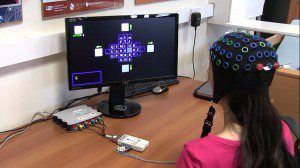By Charlene Chetcuti
Controlling technology using just your brain is no longer science fiction. It forms part of an ever-growing research area known as Brain-Computer Interfaces (BCI). BCI interprets brain signals in order to determine a person’s intention. This allows them to control anything from a robotic arm to a computer application without having to move a muscle. Electrodes are placed on a person’s scalp to detect brain activity. The electrical signals are filtered and processed to determine a person’s intent.
 Charlene Chetcuti (supervised by Prof. Kenneth P. Camilleri) developed a system that allows a computer cursor to be controlled merely by looking at a virtual keyboard. The application takes advantage of brain signals, called Steady State Visually Evoked Potentials (SSVEP), which occur when a person looks at a flickering light and the brain fires signals at the same frequency. The electrodes on an individual’s scalp can easily pick up these signals. Chetcuti designed each keyboard command to blink at different frequencies. The system could then determine where a person was looking by the frequency their brain fired, allowing remote keyboard control.
Charlene Chetcuti (supervised by Prof. Kenneth P. Camilleri) developed a system that allows a computer cursor to be controlled merely by looking at a virtual keyboard. The application takes advantage of brain signals, called Steady State Visually Evoked Potentials (SSVEP), which occur when a person looks at a flickering light and the brain fires signals at the same frequency. The electrodes on an individual’s scalp can easily pick up these signals. Chetcuti designed each keyboard command to blink at different frequencies. The system could then determine where a person was looking by the frequency their brain fired, allowing remote keyboard control.
These types of BCI systems face issues that prevent their widespread use and the performance of the system relies on visual feedback given by the user. Chetcuti designed a novel protocol, which was tested by a number of volunteers. By exploiting certain aspects of the SSVEP signal, visual fatigue was reduced and the overall system performance was improved.
BCI systems help people with mobility impairments communicate. This technology also opens up new possibilities to remotely control televisions, air-conditioners, and entertainment equipment. The Department of Systems and Control Engineering is carrying out more research to continue to improve the speed, robustness, and ease-of-use of brain-computer interfaces.
This research was carried out as part of a Bachelor of Engineering degree at the Faculty of Engineering, University of Malta.





Comments are closed for this article!